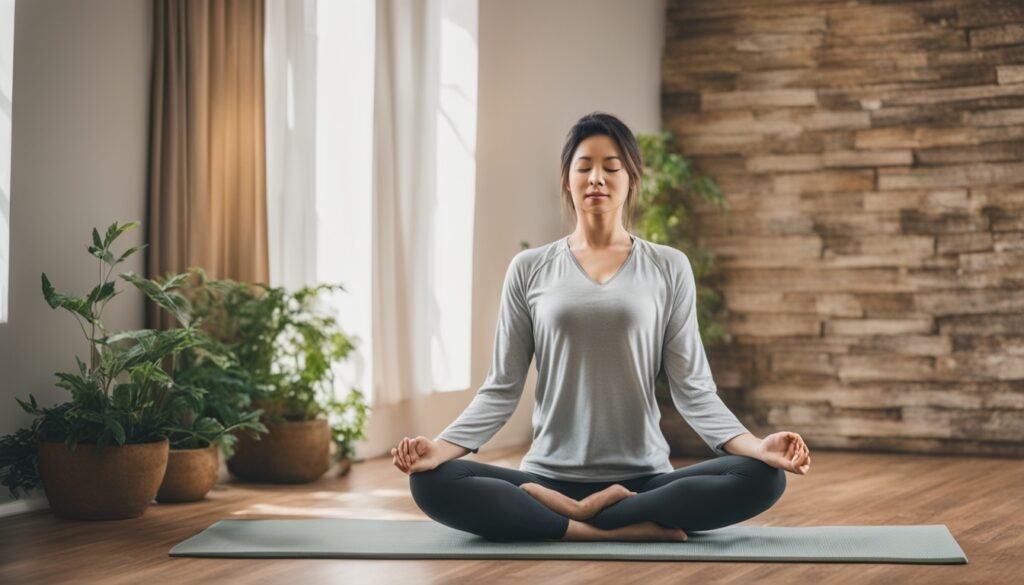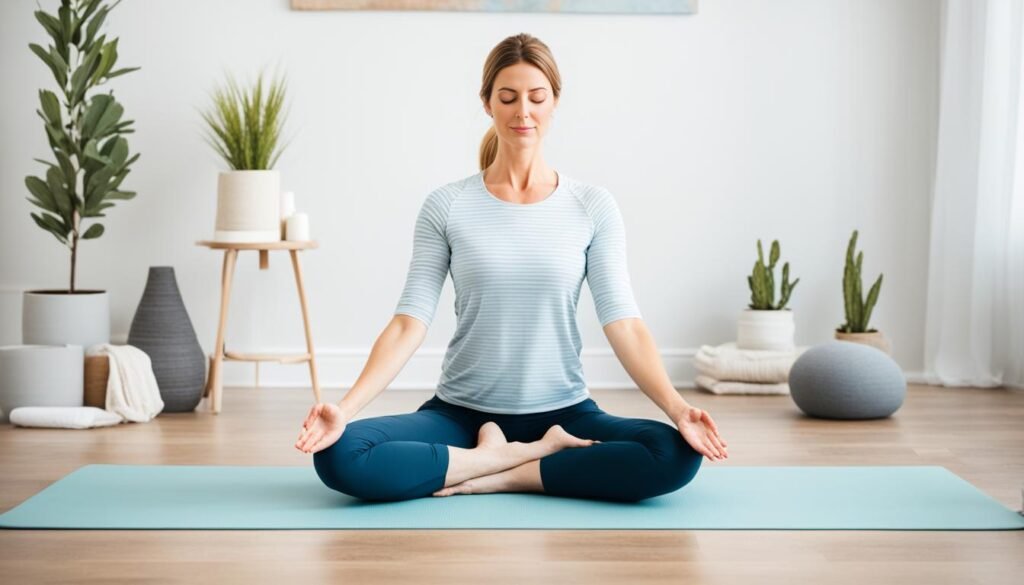Autoimmune disorders are a leading cause of chronic illness in the U.S. These issues make the immune system attack healthy cells by mistake. This can cause severe symptoms and greatly affect someone’s life. Yet, the bright side is yoga can really help those with autoimmune diseases.
These disorders can harm many parts of the body, causing long-term swelling and various symptoms like tiredness, and skin issues. Things like what we eat, how active we are, sleep, stress, and pollution seem linked to these diseases.
Key Takeaways
- Yoga can help reduce chronic inflammation and improve joint mobility for individuals with autoimmune disorders.
- Practice like mindfulness meditation, gentle asanas, and pranayama breathing can manage symptoms well.
- Yoga shows how the mind and body are connected, and helps people understand themselves better. This is especially good for those with autoimmune issues.
- Using stress reduction techniques and holistic healing can be big support for fighting autoimmune diseases.
- Getting advice from a skilled yoga therapist can help with choosing the best yoga activities for your health.
Understanding Autoimmune Disorders
Autoimmune disorders happen when our immune system attacks our own cells by mistake. The immune system is supposed to protect us from harmful things, but it can turn on the body instead. This attack can cause chronic inflammation, impacting various organs and tissues. This leads to a series of challenging symptoms.
What Are Autoimmune Disorders?
Autoimmune disorders occur because the immune system wrongly sees healthy cells as enemies. This mistake leads to the body’s defense system attacking its own parts. This can cause diseases like rheumatoid arthritis, lupus, and others.
Causes and Symptoms
The causes of autoimmune disorders are complex. They link genetic background, things in the environment, and triggers. Symptoms change depending on the disease but usually include inflammation, pain, and tiredness. They can also lead to harm in organs or systems.
Diagnosis and Treatment
Diagnosing autoimmune disorders is hard because symptoms can be like other diseases. Doctors use your health history, check you physically, and do tests to figure it out. While these conditions can’t be cured, treatments aim to control symptoms and prevent damage. This involves medications, changing how you live, and sometimes surgery.

Benefits of Yoga for Autoimmune Disorders
Yoga can be a big help for those with autoimmune disorders. It includes relaxation, deep breathing, and meditation. These can help cut down on stress which makes autoimmune symptoms worse.
Reducing Stress and Inflammation
Doing meditation regularly reduces stress hormones like cortisol. It also lowers inflammation, which makes the immune system work better. Yoga nidra, a specific relaxation method, brings deep relaxation and better sleep. This can bring a big drop in stress and help with autoimmune symptoms.
Improving Joint Mobility and Flexibility
There are yoga types that focus on stress reduction. These include gentle moving or anxiety-focused yoga. They are key for immune health and dealing with autoimmune conditions. Moving mindfully in yoga can lower stress and increase well-being. This is good for those with autoimmune illnesses.
Boosting Energy Levels
Yoga can be tailored to fit the needs of those with autoimmune issues. It can include special poses, breathing methods, and ways to focus the mind. This total approach can boost energy levels, make muscles stronger, and improve flexibility.
Enhancing Mind-Body Connection
The link between the mind and body from yoga is very useful for those with autoimmune disorders. By helping with relaxation and stress, yoga can improve both the physical and emotional sides of these illnesses.

Gentle Yoga Asanas
Practicing gentle yoga poses can offer relief for those with autoimmune conditions. These poses help in stretching, relaxing, and boosting your health. Three poses stand out for managing autoimmune issues: Tadasana (Mountain Pose), Cat-Cow Pose, and Supported Bridge Pose.
Tadasana (Mountain Pose)
Mountain Pose, or Tadasana, is a key standing pose for feeling stable and calm. It aids in stress reduction and better posture. Start by standing feet-width apart, pulling in your belly, and rooting down through your feet. Then, ease your shoulders back, lower your arms, and breathe deeply.
Cat-Cow Pose
Cat-Cow Pose combines a smooth back movement to ease pain and soreness. It’s perfect for those with autoimmune challenges. Start on all fours, wrists under shoulders and knees under hips. As you breathe in, arch your back and look up; this is Cow Pose. Breathing out, round your back and look towards your belly; this is Cat Pose.
Supported Bridge Pose
Supported Bridge Pose, a relaxing backbend, helps fight tiredness and encourages better sleep for autoimmune sufferers. Lie on your back, knees bent, feet flat on the ground. Push your hips up and slide a block or bolster under your lower back. Stay in the pose for a few minutes, breathing deeply.
Adding these gentle yoga poses to your routine can really help with autoimmune issues. Always pay attention to how you feel, and adjust the poses to make them work for you. This ensures a safe and beneficial practice.

Restorative Yoga Poses
Restorative yoga helps a lot when you have autoimmune disorders. It makes you relax and lower stress. Two great poses are Viparita Karani (Legs-Up-the-Wall Pose) and Savasana (Corpse Pose).
Viparita Karani (Legs-Up-the-Wall Pose)
Viparita Karani, or Legs-Up-the-Wall Pose, is calming and relaxing. It reduces swelling in the legs. This helps with autoimmune issues. It boosts circulation and body healing too.
Savasana (Corpse Pose)
Savasana, known as Corpse Pose, is deeply calming. It lets your body and mind unwind completely. Perfect for those with autoimmune disorders. It eases stress, drops blood pressure, and lifts well-being. Breathing deeply helps release tension, recharging both mind and body.

These poses, plus other calming methods, are key in dealing with autoimmune diseases. Relaxation and stress reduction are crucial. They help cut symptoms and boost life quality.
Yoga Practices to Follow to Manage Autoimmune Disorders
Some yoga poses help more than others for people with autoimmune disorders. Twisting poses, backbends, and gentle inversions are key. They can reduce symptoms and make you feel better if you’re battling an autoimmune disease.
Twisting Poses
Twisting poses help lower stress. Poses like Revolved Chair and Revolved Half Moon can make you feel more at peace. They’re good for your joints too, helping you move better if your joints hurt from autoimmune conditions.
Backbends
Backbends are another great benefit for autoimmune issues. Poses like Camel and Upward-Facing Dog can open your chest. They make breathing easier, which can be a big help if your lungs are affected.
This type of pose also fights off tiredness, giving you more energy.
Gentle Inversions
Legs-Up-the-Wall and Supported Shoulderstand are easy inversions that can do wonders. They help calm down inflammation. Plus, they lead to a better sleep, which is so important when your body is out of balance.
These poses also work to keep your nervous system in check. This stops stress from making your condition worse.

Pranayama for Autoimmune Disorders
Pranayama, or yogic breathing practices, can help people with autoimmune diseases. These techniques reduce stress and calm the mind. They support well-being. Nadi Shodhana (Alternate Nostril Breathing), Bhramari Pranayama (Humming Bee Breath), and Ujjayi Pranayama (Victorious Breath) are especially useful.
Nadi Shodhana (Alternate Nostril Breathing)
Nadi Shodhana, or Alternate Nostril Breathing, is great for balancing. It calms the mind and lowers stress. You close one nostril gently while you breathe through the other. This alternation soothes the nervous system. It brings inner peace, helping those with autoimmune problems.
Bhramari Pranayama (Humming Bee Breath)
Bhramari Pranayama, or the Humming Bee Breath, calms and soothes. It eases stress and anxiety. Inhale deeply and then exhale with a humming sound. It feels like a bee buzzing. This vibration is deeply relaxing. It reduces inflammation and boosts well-being.
Ujjayi Pranayama (Victorious Breath)
Ujjayi Pranayama, the Victorious Breath, is powerful. It calms the mind and stabilizes the nervous system. Make a gentle throat constriction as you breathe. This creates an ocean-like sound. It reduces stress and anxiety. This is key for those with autoimmune disorders.
Using these techniques in your yoga can help manage autoimmune issues. They focus on the breath and calm your mind. This approach helps reduce inflammation, ease symptoms, and improves well-being.

Meditation and Mindfulness
Meditation and mindfulness help people with autoimmune disorders in many ways. These practices lower stress, boost relaxation, and connect the mind and body closely.
Body Scan Meditation
Body scan meditation is a helpful technique. It involves paying close attention to different body parts. This method makes people more aware of their body’s feelings. It lowers stress and makes them feel more ‘in their bodies’.
Mindfulness Practices
Focused breathing exercises and being fully in the present are also good. These mindfulness practices offer calm and can lessen inflammation. They also help control the immune system better.
Studies back up the benefits of meditation and mindfulness. They improve health aspects like stress, mood, and the immune system. Adding these to your health routine can really help those with autoimmune disorders.
Lifestyle Modifications
Aside from doing yoga, there are other changes you can make to help if you have an autoimmune disease. These include eating a balanced diet, exercising regularly, and finding ways to deal with stress. These steps, combined with yoga, can make a big difference in managing your health. They support your body and help control the symptoms of these diseases.
Balanced Diet
Eating a balanced diet full of anti-inflammatory foods is key. This kind of diet fights inflammation and boosts the immune system. Add more fruits, veggies, whole grains, lean proteins, and healthy fats to your meals. Getting advice from a diet expert can help you find the best foods for your condition.
Regular Exercise
Keeping up with regular exercise is important. Aim for activities like walking, swimming, or light yoga to stay active. This lowers inflammation while making you feel better both physically and mentally. It also keeps your joints, muscles, and stamina strong, which is crucial for handling autoimmune issues.
Stress Management
Learning how to handle stress management is a must for those with autoimmune conditions. Stress can make symptoms worse and speed up the disease. Try relaxation methods like meditation, deep breathing, and mindfulness. They can clear your mind, lower stress, and help your body heal naturally.
By adding these steps to your lifestyle along with yoga, you’ll be more in control of your autoimmune disease. This approach can enhance your life quality significantly.
Working with a Yoga Therapist
Connecting with a certified yoga therapist can really help those with autoimmune disorders. They can craft a special plan just for you, focusing on your health needs. This includes advice on poses, breath work, and how to be mindful, which all can aid your autoimmune journey.
They know the unique hurdles autoimmune disorders bring and tackle them holistically. Expect to see soft poses, calming postures, and breathing exercises. These help lower swelling, make moving easier, and make you feel better overall.
On top of that, your yoga therapist can give you one-on-one advice. This might be about handling the tough feelings or thoughts that come with autoimmune disorders. The therapist will teach you ways to link your mind and body. Doing this often lowers stress and anxiety, which could ease your autoimmune symptoms.
Just being with a skilled yoga therapist can put you in charge of your autoimmune condition. They will help you make a routine that fits with your medical plan. This can make your life better and help you feel more even and strong on your autoimmune journey.
Yoga Retreats and Workshops
Joining a yoga retreat or workshop made for people with autoimmune disorders can change your life. You’ll be in a place that’s caring and helpful. There, you can make your yoga skills better, learn from top teachers, and meet others with similar issues.
Benefits of Attending a Yoga Retreat
Yoga retreats let you escape everyday stress to focus on yourself. By diving into yoga, you can find peace inside, kick out stress, and feel the real yoga benefits. They are especially good for those with autoimmune conditions. They can help with inflammation, sleep, energy, and making your mind and body work better together.
Kaivalyadhama Yoga Retreat for Autoimmune Disorders
The Kaivalyadhama Yoga Retreat is perfect for people with autoimmune disorders. It happens over three days in a calm Spanish villa. There, you’ll get to do many types of yoga. Plus, you’ll have special massages and eat a diet that helps keep your muscles strong and immune system up.
